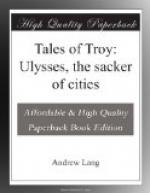Nestor was much respected because he remained brave, though he was too old to be very useful in battle. He generally tried to make peace when the princes quarrelled with Agamemnon. He loved to tell long stories about his great deeds when he was young, and he wished the chiefs to fight in old-fashioned ways.
For instance, in his time the Greeks had fought in clan regiments, and the princely men had never dismounted in battle, but had fought in squadrons of chariots, but now the owners of chariots fought on foot, each man for himself, while his squire kept the chariot near him to escape on if he had to retreat. Nestor wished to go back to the good old way of chariot charges against the crowds of foot soldiers of the enemy. In short, he was a fine example of the old-fashioned soldier.
Aias, though so very tall, strong, and brave, was rather stupid. He seldom spoke, but he was always ready to fight, and the last to retreat. Menelaus was weak of body, but as brave as the best, or more brave, for he had a keen sense of honour, and would attempt what he had not the strength to do. Diomede and Ulysses were great friends, and always fought side by side, when they could, and helped each other in the most dangerous adventures.
These were the chiefs who led the great Greek armada from the harbour of Aulis. A long time had passed, after the flight of Helen, before the large fleet could be collected, and more time went by in the attempt to cross the sea to Troy. There were tempests that scattered the ships, so they were driven back to Aulis to refit; and they fought, as they went out again, with the peoples of unfriendly islands, and besieged their towns. What they wanted most of all was to have Achilles with them, for he was the leader of fifty ships and 2,500 men, and he had magical armour made, men said, for his father, by Hephaestus, the God of armour-making and smithy work.
At last the fleet came to the Isle of Scyros, where they suspected that Achilles was concealed. King Lycomedes received the chiefs kindly, and they saw all his beautiful daughters dancing and playing at ball, but Achilles was still so young and slim and so beautiful that they did not know him among the others. There was a prophecy that they could not take Troy without him, and yet they could not find him out. Then Ulysses had a plan. He blackened his eyebrows and beard and put on the dress of a Phoenician merchant. The Phoenicians were a people who lived near the Jews, and were of the same race, and spoke much the same language, but, unlike the Jews, who, at that time were farmers in Palestine, tilling the ground, and keeping flocks and herds, the Phoenicians were the greatest of traders and sailors, and stealers of slaves. They carried cargoes of beautiful cloths, and embroideries, and jewels of gold, and necklaces of amber, and sold these everywhere about the shores of Greece and the islands.




